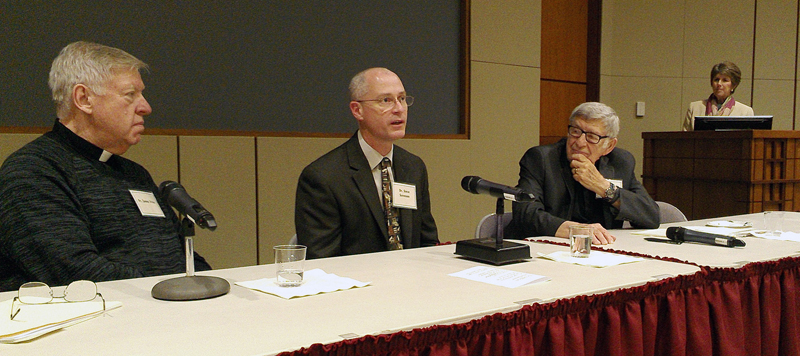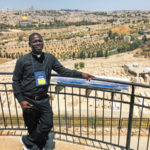By Barb Arland-Fye
The Catholic Messenger
DAVENPORT — Dr. Steve Sorensen got right to the point during an April 27 panel discussion about the difficult conversation people need to initiate with loved ones and their doctors about end-of-life decision making.

Panelists who participated in “The Difficult Conversation” discussion about end-of-life decision making April 27 at Genesis East in Davenport were, from left, Father Jim Vrba, pastor of St. John Vianney Parish in Bettendorf; Dr. Steve Sorensen of Genesis Family Medical Center, Davenport; and Chaplain Marlin Whitmer of Trinity Episcopal Church in Davenport.
“Have you sat down with your family and talked about what you might want if something drastic were to happen?” Sorensen asked the audience. “If you were in the emergency room and you had been in a horrible accident or you’d had a major stroke or you’d had a significant heart attack, would your family know what you want in that situation? If you haven’t had that conversation with your family, it’s probably about time that you do,” added Sorensen, one of three panelists in a discussion at the Adler Education Center of Genesis East.
The other panelists were Father Jim Vrba, pastor of St. John Vianney Catholic Church in Bettendorf, and Chaplain Marlin Whitmer of Trinity Episcopal Church in Davenport. Chris McCormick Pries, clinical director at Vera French Mental Health Center in Davenport and a member of the St. John Vianney health cabinet, served as moderator.
Sorensen said he has the privilege of working in palliative care, a field of medicine which seeks to improve quality of life for patients dealing with life-threatening illnesses and their families. To start a conversation with patients and their families, Sorensen asks: ‘“So how long have you been fighting this?’ Then, I sit back and I just listen. People want to tell you their story.” Afterwards, he collaborates with the patient’s other doctors on a treatment plan.
Fr. Vrba said that his dad, 99-1/2, suffered from various ailments and was hospitalized earlier this year after a fall. “We had time to ask, ‘Dad what do you want to do?’” His dad told his three children he didn’t want to go into a nursing home. They explained they didn’t have other alternatives; they could no longer care for him at home as he would like. Their dad was resigned to that fact, but died March 3 “the day he was supposed to go into the nursing home.”
The night before, father and son watched a movie together at the hospital and enjoyed a nice conversation. They wished each other goodbye in Czech, as they always did. His dad’s death the following morning was a surprise, but “I firmly believe Dad got his way, as he always has,” the priest joked. To those who sent sympathy cards, Fr. Vrba wrote, “We’re all going to miss him very, very much … but on the other hand, he now is with mom, experiencing the eternal love of Jesus, together.”
In response to a question from McCormick Pries about how to approach having a conversation on palliative care, Sorensen noted: “Being a participant in medical care is not a spectator sport. You really have to take a role in your own care … down to having a say, and having some control over what you choose to do and what you choose not to do. But as a consumer of medicine you’re not expected to know everything you need to know to make those decisions.” Consult with health care professionals you trust to provide guidance. “There are so many things we can do in medicine; do we need to do all of them?” Sorensen asked. “We need to be open and honest in having those conversations.”
The conversation, as he and others noted, should lead to written instructions, such as an IPOST (Iowa Physician Orders for Scope of Treatment) that allows individuals to communicate their preferences for key life-sustaining treatments. IPOSTs are appropriate for the frail elderly, or individuals with chronic, critical medical conditions or terminal illness. (See http://tinyurl.com/p936cek.)
Responding to McCormick Pries’ question about church teaching on end-of-life decisions and withholding care, Fr. Vrba noted that what might have been considered extraordinary care in years past has now become ordinary care. From the Catholic Church’s standpoint, “we recognize the importance of feeding, making sure a person is being hydrated — unless doing so causes more danger or causes more complications.” His mother, who died at age 92, suffered from an inoperable blockage in the small intestine. “Mom decided, ‘Let nature take its course. I love you all very, very much. Keep me comfortable and we’ll be seeing one other again.’” Letting nature take its course is appropriate in church teaching, Fr. Vrba said.
Whitmer, a caregiver to his first wife as she was dying, encouraged the audience to keep a daily journal. “You can be helping yourself be better care givers, better professionals, (and) better able to listen because you will be maintaining yourself while you’re involved in very intense kinds of work.”
During a question and answer session, panelists were asked whether making the choice for death with dignity should be denied to physicians who support that option if the Iowa legislature approves it. The panelists pointed out that every life is valuable and that the most important thing is allowing individuals control over how they will live out that life.
“If I truly believe, and I do, that God is the giver of all life, I have a responsibility to live that life to the fullest that God has given me,” Fr. Vrba reflected. Euthanasia “goes against everything I am as a person created in God’s image and likeness.”
Still another question focused on hospice. Sorensen said he is amazed at the lack of understanding about what hospice is: “an amazing thing that focuses on bringing people comfort at the end of life.” Audience member Dr. Ann O’Donnell observed that hospice isn’t about giving up on life. Hospice is a change in goals.











